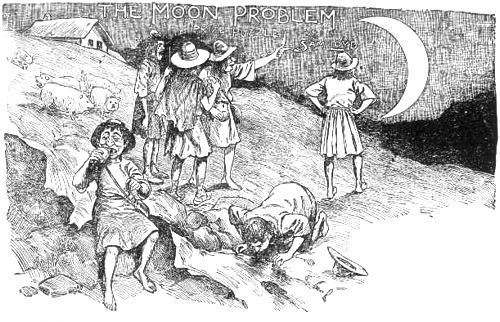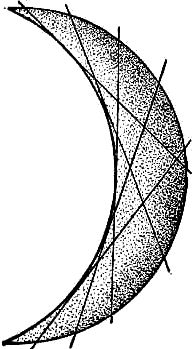



“SPEAKING ABOUT the possibility of treating disease through the influence of will power,” says a noted specialist in a recent contribution to a medical journal, “I wish to say that in Switzerland the power of imagination is so strong among the wild mountain swine herdsmen that they will eat their sour brown bread with great relish through believing that they get slices of cream cheese from the moon! They actually go through the motions of cutting the air, and like little children quarrel over imaginary portion?”
“Nevertheless,” he added, “it was plain to be seen that they were in no way benefited, so far as the putting on of flesh was concerned, by their delusions.”
Not being interested in the Christian Science side of the question, I was merely struck by the suggestion of an odd puzzle proposition arising among those peasants as to the possible number of pieces of cheese. Therefore, indulging the foolish fancy of those men as shown in the sketch, let us suppose that the expert carver of the party is speculating as to the greatest possible number of pieces into which he can divide the moon with six straight cuts of a knife. The wild luncheon party are unfortunately reduced to short rations in having the last quarter of the old moon to feast upon, so they are trying to make the most of it. Are you clever enough to help them?
With a pencil and ruler mark off the pictured moon with six straight lines and see how many pieces you can produce, and if you guess it correctly you will note a difference between this and the famous problem of the Boarding House Pie, as well as the cheese problem which introduced other geometrical principles.
By taking the best possible advantage of the crescent form of the moon, our clever puzzlists have succeeded in producing fifteen pieces of cream cheese for the hungry mountaineers, as shown in the following sketch:

2. An Oriental Love Story
He said I was beautiful, he did. I assure you; and I know he was right, for my skin was as soft as satin and white like ivory, my figure slender and elegant.
Our first meeting was in a shop, and he made no attempt to disguise his admiration. He praised me up to the skies and called me “very dear.” From that day and for many months we were inseparable. I occupied all his thoughts.
Again and again he gazed with indescribable affection at my wonderful complexion, my graceful figure, and pressed me to his lips.
His embrace was tenderness itself, and whenever some trifling accident marred my beauty—if only for a day—his anxious solicitude knew no bounds. At night I rested on velvet pillows, and by day I accompanied him wherever he went.
He always enjoyed my society, even when nothing else afforded him pleasure.
He would turn to me, and not in vain, for comfort and relief when all other friends proved faithless. Oh! why was it not fated to be ever thus?
Alas! one day in a public thoroughfare I had a heavy fall, and, though it was through his fault, I was never the same to him as before. This cruel misadventure fairly broke me down. True, he endeavored afterwards to make amends for his harsh treatment.
He treated me with the greatest consideration and loaded me with silver; but the light of former days had gone out.
He tried to leave me as before, but in vain; his feelings had undergone a complete change, and now I am nothing but a miserable wreck of my former self.
Here I lie, all alone in my sorrow, a forsaken, broken—?
This story, which will be “continued in our next,” is to be completed by the use of one word. How many of our puzzlists can guess the word which will prove to be a key to the whole mystery?
The Oriental love story tells of a broken pipe!
[Page 144]